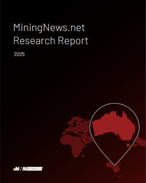This article is 8 years old. Images might not display.
The company recorded a net profit after tax of $104.6 million, including the $15 million profit, on the sale of the Plutonic mine.
Earnings per share jumped by 60% to a record 17.4c, with return on equity at an “industry leading” 43%.
The company declared an interim dividend of 3c per share, after paying a special 3c per share dividend in November from the Plutonic sale.
“We’re delighted with this result,” Northern Star executive chairman Bill Beament told investors this morning.
Cash, bullion and investments rose to $303 million at the end of December, and the company had available liquidity of $525 million, giving it the “strongest balance sheet in the Australian sector”.
Northern Star was questioned by analysts over high cash generation and future growth plans.
“It’s a great problem to have,” Beament said, adding that the company was finalising the strategy around getting production to 600,000 ounces of gold per annum.
“There’ll be a lot more meat on the bones of that strategy mid-year,” he said.
The expansion of the Kanowna Belle plant at Kalgoorlie has been approved, and Beament said the board had just signed off on an $18-19 million expansion of the Jundee plant.
Outside that, the company is building the Millennium mine and still has the Central Tanami project, which is moving forward at a slower pace.
Beament said Northern Star, as well as the broader Australian gold sector, had the benefits of strong balance sheets and exploration upside.
“It’s something that’s still not fully appreciated by global investors,” he said.
RBC Capital Markets analyst Paul Hissey said the results were solid and in line with estimates.
“The key from here, in our view, is appealing to a new group of large cap generalist investors (given Northern Star's inclusion in the ASX100) and also delivering incremental upside to growth/earnings,” he said.
Shares in Northern Star were up by 0.8% to $4.515.
























